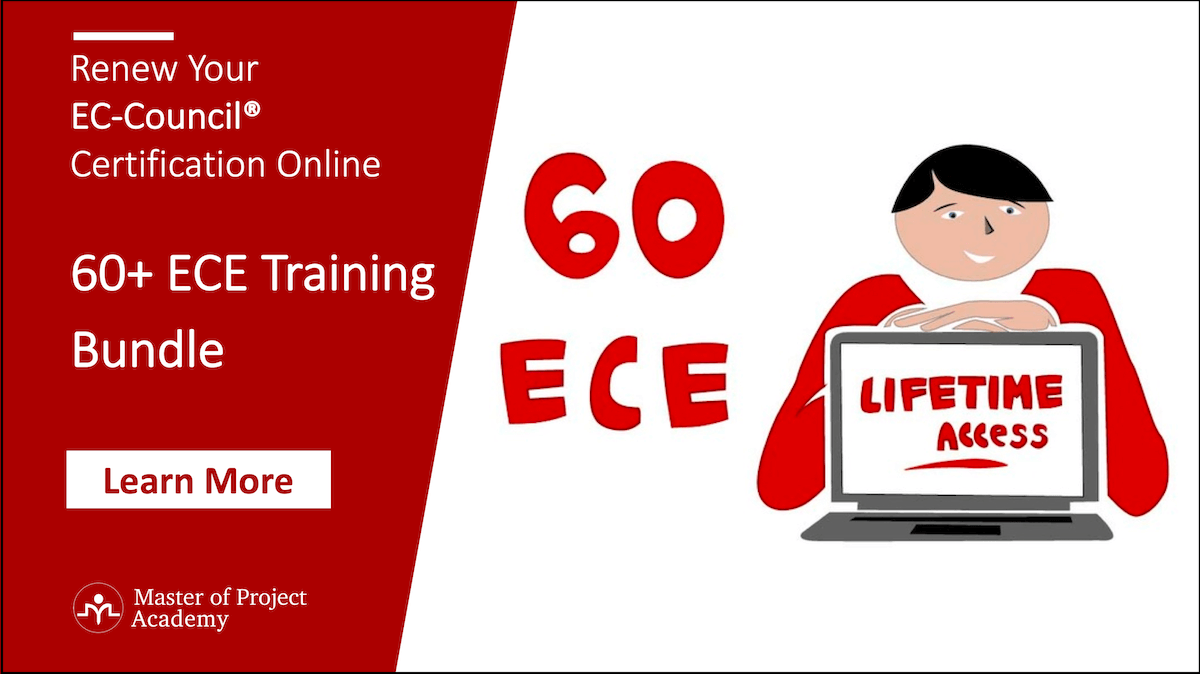If you have any EC-Council certifications (ENSA, CND, CEH, CHFI, ECSA/LPT, ECVP, ECSP, EDRP, CCISO, CEI, ECIH, ECDR-VT, CAST, ECES, CIMP, and CDM) you must renew these certifications in every three years. For instance, if you have CEH certification from EC-Council, according to EC-Council ECE Policy, you must earn ECE credits every three years for CEH renewal.
Otherwise, your EC-council certification will expire and you will have to re-take the certification exam to earn the certification. In this post, we have identified the details of the EC-Council ECE Policy. Read now to learn all details about EC-Council certification renewal.
EC-Council ECE Requirements
As many other reputable certifications require, EC-Council ECE policy also requires the certified professionals to keep their knowledge and experience up to date with changing dynamics of the market. EC-Council manifests the need for recertification with the following words in its EC-Council ECE policy
“The certification body shall define recertification requirements according to the competence standard and other relevant documents, to ensure that the certified person continues to comply with the current certification requirements.”
According to EC-Council ECE requirements, keeping your knowledge up to date can be ensured through several sources including but not limited to education, seminars, exams, authoring books, contributing to the profession, etc. We will go through the most common ways of earning EC-Council credits in this post.
- If you have an EC-Council certification, you must earn 120 ECE credits every three years to renew your EC-Council certification.
- EC-Council requires the credits submissions each year. This means you must submit 40 ECEs each year to complete your 120 ECE credits each year for EC-Council certification renewal.
- Another requirement of EC-Council recertification is you must pay an annual membership fee. This is $80 per year.
Check our EC-Council ECE Credit Training Video
What Happens If I Do Not Submit ECEs and Do Not Renew EC-Council Certification?
If you cannot earn 120 ECEs in three years period, EC-Council will suspend your certification. If your EC-council certification is suspended, you cannot use the EC-Council designations, logos, and any other benefits of EC-council membership.
If your EC-council certification is suspended, you can still earn 120 ECEs in a year after expiration and your certification can be re-instantiated. Note that, EC-Council will wait for another 120 credits for the remaining two years to renew your EC-council certification. This is for not falling in suspension again for the new three-year period. Therefore, we recommend earning EC-Council credits each year and submitting them appropriately to go under certification suspension.
At the end of the EC-council certification suspension period, if the certified professional could not meet the EC-Council recertification requirements, his or her certification will be revoked. In this case, you must re-enter and pass the certification exam to get the EC-Council certification.
If there is something wrong with your suspension or revocation, you can contact EC-Council within 90 days after suspension or revocation.
EC-Council ECE Audit
EC-Council does not require any evidence during submission. However, in order to ensure the compliance of submitted credits with the EC-Council ECE program, they might ask you to provide additional documents regarding your ECE submission.
For instance, if you attended in a training, and if EC-Council is auditing your training, you can show your letter of enrollment or certificate of completion from the training provider to prove that you attended in related ECE activity. In case EC-Council audits your ECE submissions, you can contact your activity provider and they will provide you relevant documents accordingly.
How Can I Submit Earned EC-Council Credits?
All EC council members must use Aspen Portal to submit their ECE credits. Make sure you pay the annual EC-Council membership fee and you submit your earned credits every year. Do not wait until the end of three-year period to submit your ECEs. Otherwise, your EC-Council certification might fall into suspension.
Which Activities Are Qualified for EC-Council Credits?
EC-Council counts only IT security-related activities. These can be IT seminars, reading IT security books, publishing a paper on IT Security related topics, and anything that updates your knowledge on IT Security not only from EC-Council.

Credits for each resource are as below:
- Volunteering – 1 credit for each hour you will spend
- Association/Organization Chapter Meeting (per Meeting) – 1 credit per hour
- Author Article/Book Chapter/White Paper – You can contribute to authoring an IT security related book, chapter or paper and earn 20 credits. Note that, if you write the whole book, you will earn 100 credits.
- Education Course – You can earn one ECE credit per hour for any IT security-related course you will attend. Attending an online IT security training is the most convenient and affordable way of earning EC-Council credits and renewing your EC-Council certification. For this reason, we prepared a 60 ECE Credits bundle which will help you to earn 60 credits 100% Online.
- Seminar/Conference/Event – You will earn one ECE credit for every hour of a seminar, conference, or similar event you will attend.
- Higher Education – If you are continuing to higher education in IT security (e.g. master’s or Ph.D.) you can earn 15 credits per semester hour
- Identify New Vulnerability – If you identify an IT security-related vulnerability, you can earn up to 10 ECEs
- Presentation – You can share your IT security knowledge with your colleagues, in a chapter meeting or at a conference. You will earn three credits per every hour you will present.
- Reading an Information Security Resource – You can earn up to five credits by reading an IT security-related book, article, review, or case study.
- Teach New – You can prepare a course or organize a workshop and teach people about IT security. You will earn 21 credits per day for teaching IT security. This is generally an eight hours per day course.
Which certifications are in EC-Council ECE Program?
EC-Council does not require the credits to be earned for its every certification. EC-Council certifications that belong to ECE (EC-Council Continuing Education) system are actually EC-Council Examinations. These are CEH (Practical), ECSA (Practical), LPT (Master), ENSA, CND, CEH, CHFI, ECSA, LPT, ECVP, ECSP, EDRP, CCISO, CEI, ECIH, ECDR-VT, CAST, ECES, CIMP and CDM.
If you have any of these EC-Council certifications, you must earn 120 credits in every three years to renew your certification.
Summary
We are in the age of cyber security and IT security certifications play a vital role if you are planning to get an IT security job. Employers seek reputable certifications when filling an IT security position. Therefore, it is very important to maintain your earned EC-Council certification. To do this, you must earn 120 Credits each three years.
You can consider enrolling in our 60 ECE Credits bundle to complete your credits needs and renew your EC-Council Certification.

